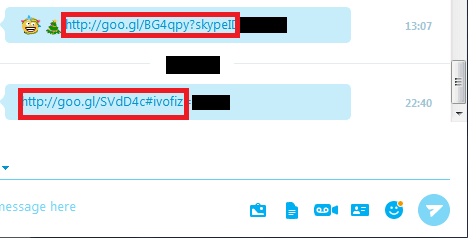Have you encountered the Goo.gl virus in Skype or Facebook? This article aims to help you understand the nature of this virus as well as show you how to remove it from your device completely.
Goo.gl
Goo.gl virus is the name used by users to label the malicious application spreading malware infection through Skype, Facebook and other social networks. The Goo.gl virus is in fact a Trojan horse in disguise but we will get to that in a brief moment. Before that though, let’s clear something up.
What is Goo.gl?
Goo.gl is a legitimate service provided by Google for shortening of URLs. What is essentially does is take long URL addresses and crunch them inside far fewer characters. In this way a link gets easier to share, email, retweet, whatever social network interaction you can think of would benefit from a shorter web link. And while the EULA for this service states that “short URLs do not publicly reveal the identity of the user who created that URL mapping” and “short URL history for a user is accessible only when signed in using that Google Account” this is a preferred method for malware spreading. Why? You can’t see the full link before opening it, thus it is much easier to trick the victim into clicking on the link.

Skype Goo.gl Virus – What is it?
If you are interested in this article it is most likely that you have received a skype message from one or more of your Skype friends with a somewhat strange message contained inside as well as a goo.gl link. Unfortunately the user that has sent you the message is infected with the Skype Goo.gl virus and if you clicked and followed the link inside the message you are probably infected as well. You probably have a type of malware known as a Trojan horse and very soon if not already you will find out that you have started sending similar skype messages to people in your contact list as well. Regrettably this might not be the worst of it.
If you indeed have a Trojan in your system you might be in a big trouble. Trojan horses have seen regular use as backdoors for far more dangerous malware known as Ransomware. This type of software encrypts your files making them completely inaccessible and a Ransom payment is demanded to get a decryption key. Even if you don’t get a Ransomware, which we sincerely hope you won’t, there are other way for which the Trojan horse might make your life miserable:
- The use of your computer as a malware spreading or spamming machine (we already established that).
- Your device might be used for Bitcoin mining, greatly shortening the life-span of your hardware and significantly increasing your electricity bill.
- Your PC might be used as a “proxy of sorts” to launch cyber attacks and other cyber criminal activities, much like the Skype messages sent to your friends without your knowledge or participation.
- Your personal information might be in immediate danger. Including user names and passwords. If you are using any type of online payments methods you should be extremely alarmed and change your passwords immediately after you remove the Goo.gl virus.
- If you notice that some of your files are corrupted or missing that might be a direct effect of the presence of a Trojan horse virus in your system.
In additional to our removal instructions, please do not forget to change your Skype and/or Facebook password, depending on how far this infection has spread. This is a problem that should not be taken lightly. You should also consider contacting your friends and warning them not to open the malicious goo.gl links. If they have already done so send them a link to this article, we are trying to help as many of the affected users as possible.
SUMMARY:
| Name | Skype Goo.gl Virus |
| Type | Trojan Horse |
| Detection Tool |
Some threats reinstall themselves if you don’t delete their core files. We recommend downloading SpyHunter to remove harmful programs for you. This may save you hours and ensure you don’t harm your system by deleting the wrong files. |
Skype Goo.gl Virus Removal
You are dealing with a malware infection that can restore itself unless you remove its core files. We are sending you to another page with a removal guide that gets regularly updated. It covers in-depth instructions on how to:
1. Locate and scan malicious processes in your task manager.
2. Identify in your Control panel any programs installed with the malware, and how to remove them. Search Marquis is a high-profile hijacker that gets installed with a lot of malware.
3. How to clean up and reset your browser to its original settings without the malware returning.
You can find the removal guide here.
For mobile devices refer to these guides instead: Android, iPhone

Leave a Reply